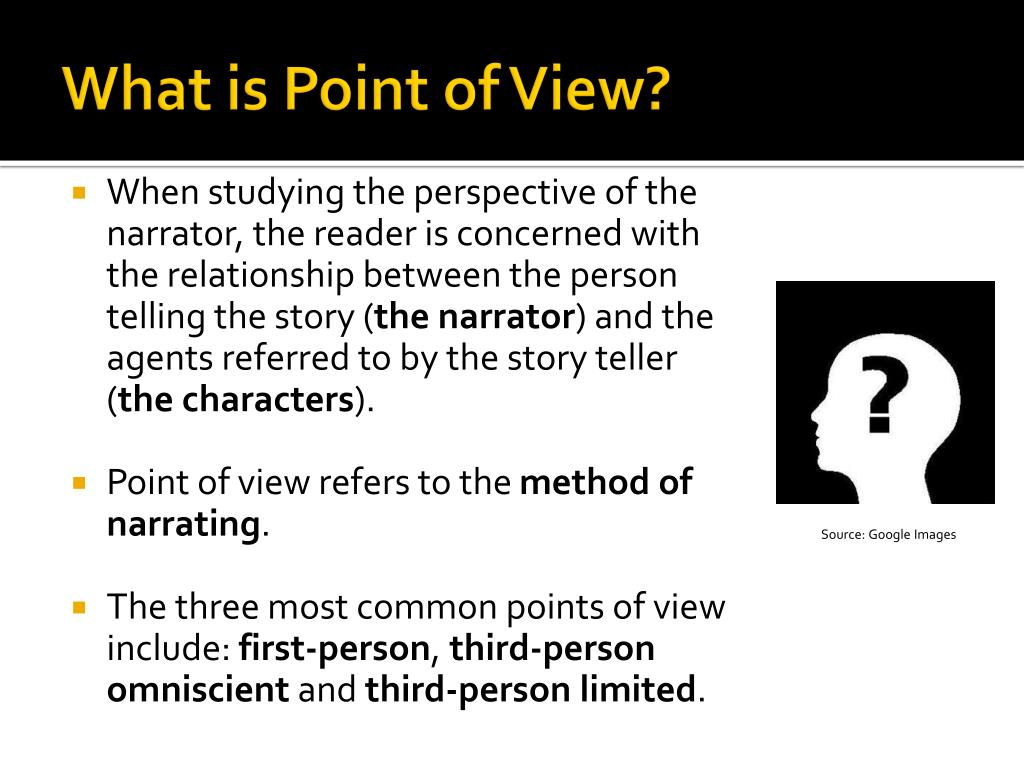

As told by the narrator, though, it seems like Mrs. An omniscient narrator will talk about multiple characters, taking all of their points of view into account when telling the story. Mallard to be selfish or believe that she didn't love her husband. If that were related to us in first person, we might think Mrs. Even though freedom's scary at first she's excited about it by the end. The present paper is based on different pieces of fiction like The Lagoon by J. Mallard is on the verge of thinking something complicated and not very nice – the short version of that would be, she's kind of glad her husband's dead because she gets to be free. The three primary points of view are first person, in which the narrator tells a story from their own perspective ('I went to the store') second person, in which the narrator tells a story about you, the reader or viewer ('You went to the store') and third person, in which the narrator tells a story about other people ('He went to the store'). A story-teller or narrator that is called point of view is present in all verbally told stories. She's helpless to resist them, passive and powerless. Mallard's fault she has these feelings – they chase her down. However, The Hobbit is mainly told from the third-person omniscient point of view, an outside narrator who is aware of the internal thoughts, motivations, and feelings of the characters and can. But she felt it, creeping out of the sky, reaching toward her through the sounds, the scents, the color that filled the air. The narrator is all-knowing, allowing the writer to enter the minds of anyone they want. Austen invariably used this omniscient perspective, and it remains a popular means of narration amongst contemporary writers.
#OMNISCIENT NARRATOR POINT OF VIEW FULL#
What was it? She did not know it was too subtle and elusive to name. The preferred narrative approach in classic literature. An omniscient narrator is one that exhibits full knowledge of the actions, thoughts and feelings of each of the characters in the story. There was something coming to her and she was waiting for it, fearfully. Mallard cringes away from the approaching feeling of freedom:


For example, look at this description, stated by the narrator, of how Mrs. The narrator seems to be excusing her behavior and thought process, or at least providing reasoning for it. The narrator you create to speak in the third person omniscient POV will need to relay the thoughts and feelings of all the relevant characters in the scene. In prevailing literary critical parlance, both the terms objective narrator and omniscient narrator are reserved for non-participant voices. Mallard more sympathetic and understandable. The use of third-person omniscient narrative voice also keeps Mrs. Mallard were telling the story in first person, readers would be exposed to a whole different explanation of her weak heart, and the story would end very differently – and somewhat earlier. Mallard doesn't, and because the story ends after Mrs. This is key because the opening of the story begins with us readers knowing something Mrs. The use of an omniscient third-person narrator enables Chopin to tell a complete story that's not limited to the protagonist's point of view.


 0 kommentar(er)
0 kommentar(er)
